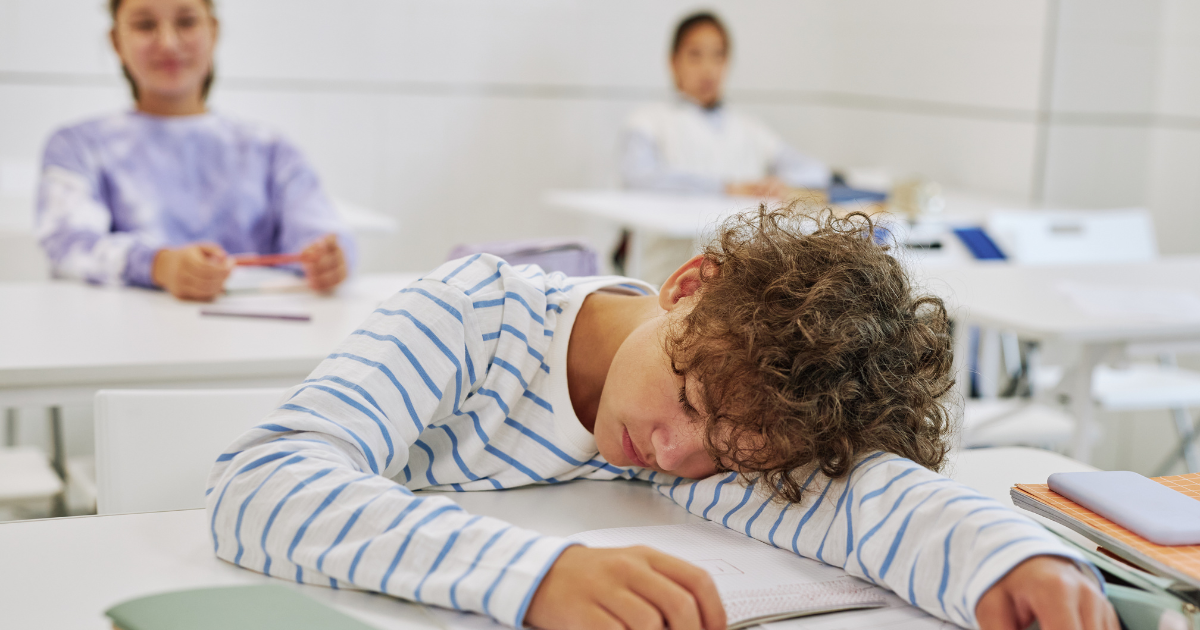Delayed School Start Times May Help with Teenage Depression

Sleep and mental health have a complex, bi-directional relationship. Regardless of your age, if you have depression and add sleeping pills to the mix, that can be a dangerous combination—which is why sleep issues may be best solved with all-natural solutions like Sip2Sleep®.
Creating a solid, healthy sleep habit is critical for young people, which is why many schools are considering or implementing delayed start times. School start times vary but are typically between 7:30 – 8:30 a.m. This means teens often need to wake up no later than 6:30 a.m. in order to get ready for the day, have breakfast, and potentially commute.
Research has long shown that teenagers aren’t getting enough sleep in the U.S. with just 30 percent of high schoolers getting the recommended eight hours of sleep per night according to the Centers for Disease Control. Anyone who doesn’t get the sleep they need, including teens, are at a higher risk of developing depression, substance abuse, becoming obese, and, of course struggling with their academic performance.
Our circadian rhythms are driven in part by light, and our bodies are “told” they should be sleepy when it gets dark and alert when there is light. However, it’s not that simple, and our clocks change as we get older. This is partially why many adults find themselves getting up earlier and earlier as they age—because their body clocks are adjusting.
Teenagers have different “body clocks,” which on average “tells” their bodies to go to sleep between 11 p.m. – midnight. Teen clocks also tell them to wake up around 9 a.m. Obviously, this isn’t going to work with the school day.
The Importance of Sleep
So, why do school days start so early, anyway? There is mostly no real reason for it today—it’s just tradition. In generations past, there was typically a parent who stayed at home, so aligning school with the typical 9-to-5 adult work schedule wasn’t necessary. Today, various classes, extracurriculars, bus routes, and more have helped in keeping school hours early. But there’s no good reason for it.
School schedules are contrary to the typical teenager’s internal circadian rhythms, which sets them up for failure. This has been known for quite some time, and a research paper in 1998 showed that when a small group of teens started school just one hour earlier, they suffered from “significant sleep deprivation and daytime sleepiness.”
Also Read: Why Sleep Deprivation Can Lead to Serious Health Issues
Unsurprisingly, moving start times forward was found to have the opposite result. There was a 2002 study in Minneapolis where school times shifted from starting at 7:15 a.m. to 8:40 a.m. This allowed for one extra hour of sleep and resulted in fewer depression symptoms. In 2010, a similar study was done in Rhode Island where the start time was moved from 8 a.m. to 8:30 a.m., resulting in students being more energetic and in better moods during the day. In more recent years, a 2021 study showed that middle schoolers and high schoolers in Denver enjoyed “sufficient daily sleep” after start times were delayed 40 – 70 minutes (depending on the school).
Strikingly, another 2021 study in Colorado found that teens whose school day started before 8:30 a.m. were slightly more likely to attempt suicide. However, this study was small, and researchers are calling for further investigation into these results. There are also many confounding variables, including depression, that could muddy the study. Still, it is worthwhile to consider when thinking about delaying start times.
Sleep and Depression
It is a common myth that those who are depressed sleep more, but this can certainly be the case. However, depression can also cause troubles when falling asleep—and sleeping too much can also be an issue. If you are challenged when it comes to falling asleep or staying asleep, it’s important to see a professional and get to the root cause. Since depression and sleep are intertwined, “treating” one might inherently help with the other.
Also Read: Can't Sleep? Discover Why Sip2Sleep® Works Better Than Melatonin
You can also add organic sleep aids to your nightly routine, such as Sip2Sleep®, which is made with just two ingredients: tart cherry extract and Venetron®. It is an excellent addition to good sleep hygiene with no systemic side effects or addictive components.







